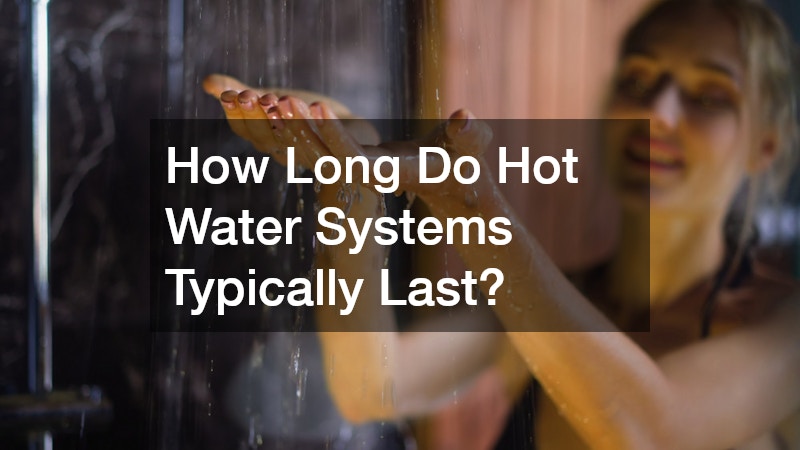Hot water systems are essential to modern Australian homes, providing the comfort and convenience of readily available warm water for showers, cleaning and household chores. While homeowners often take these systems for granted, their longevity is a crucial consideration for budgeting, home maintenance and energy efficiency.
Understanding how long hot water systems typically last can help property owners plan replacements proactively and avoid the inconvenience of unexpected breakdowns.
Average Lifespan of Hot Water Systems
The typical lifespan of hot water systems in Australia ranges between 8 and 20 years. However, several factors influence this broad range, including the type of system, the brand and model, water quality, maintenance practices and installation standards. Electric storage systems, for example, tend to last around 8 to 12 years. Gas storage systems can last a bit longer, often between 10 to 15 years, while continuous flow or tankless water heaters may provide service for 15 to 20 years. Solar hot water systems also have extended lifespans, generally ranging from 15 to 20 years, especially when properly maintained.
It is important to note that while the core unit may last for a specific period, components such as sacrificial anodes, thermostats and valves may require replacement or servicing within that time frame to ensure optimal function and efficiency.
Signs Your Hot Water System Is Nearing the End
Recognising when a hot water system is approaching the end of its useful life can save homeowners from cold showers and potential water damage. One common indicator is a change in water temperature—either fluctuating temperatures or water not heating up as effectively. Rust-coloured water, especially when using hot taps, may signal internal corrosion, particularly if your system uses a steel tank.
Unusual noises, such as rumbling or popping, often suggest a build-up of sediment within the tank. This sediment reduces heating efficiency and accelerates wear and tear. Another warning sign is leaking water, which can result from a corroded tank or failing pressure relief valve. Lastly, frequent repairs or increased running costs due to reduced energy efficiency should prompt a review of the system’s viability. If your unit is more than a decade old and exhibiting one or more of these issues, replacement is likely the most economical long-term option.
Factors That Influence Longevity
Several factors influence the lifespan of hot water systems. Water quality plays a significant role—hard water with high mineral content tends to lead to more sediment accumulation and corrosion, shortening a system’s effective life. The installation process is equally important. Poor installation can lead to structural stress, improper drainage or inefficient operation.
Usage patterns are another key variable. Larger households with higher hot water demand may experience faster wear on the system compared to a smaller home with lower usage. Additionally, regular maintenance is vital.
Climate can also affect longevity. In coastal or highly humid areas, corrosion may occur more rapidly unless corrosion-resistant materials are used. For solar systems, exposure to full sun and correct orientation of panels are crucial to maintaining long-term performance.
When to Repair Versus Replace
Deciding whether to repair or replace a hot water system depends on age, condition and cost-effectiveness. Repairs might be suitable if the system is relatively new and the issue is minor, such as a faulty thermostat or worn-out valve. However, older units experiencing recurring issues usually warrant replacement.
An important consideration is energy efficiency. Newer models are typically more energy-efficient and environmentally friendly than older units. Upgrading to a modern system may reduce utility bills, offsetting the upfront cost over time. Furthermore, switching to a different type of hot water system, such as from electric to solar or heat pump, may be advisable depending on your household’s needs and sustainability goals.
Extending the Life of Your System
Preventative maintenance is key to maximising the life of hot water systems. Routine professional inspections can identify early signs of wear and allow for timely repairs. Replacing the sacrificial anode every five years can protect the tank from corrosion. Regularly flushing the system helps remove sediment build-up, particularly in areas with hard water.
Additionally, investing in quality systems from reputable brands ensures reliability and access to parts and service. Installation by licensed professionals also contributes to optimal performance and compliance with Australian safety standards.
Planning for Replacement
Even with excellent care, all hot water systems eventually need replacing. Homeowners should keep records of installation dates and service history to track system age and performance trends. Planning for replacement rather than reacting to failure reduces stress and avoids emergency costs.
Consulting a licensed plumber or hot water specialist can help determine the best system based on your property’s layout and energy goals. Many providers also offer packages that include installation, disposal of the old unit and ongoing service support.
Hot water systems are a long-term investment in home comfort and functionality. While their lifespan varies depending on type, usage and maintenance, most systems offer reliable service for 8 to 20 years. By recognising signs of ageing, performing regular maintenance and planning for timely upgrades, homeowners can avoid disruptions and improve energy efficiency. Whether you’re maintaining an existing system or exploring a new installation, understanding the typical lifespan of hot water systems is key to making informed, cost-effective decisions.
.

